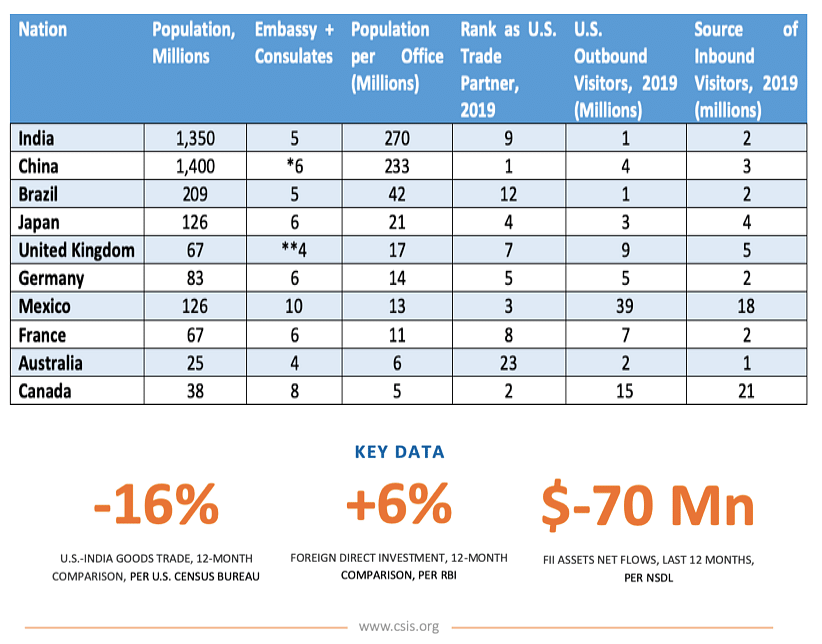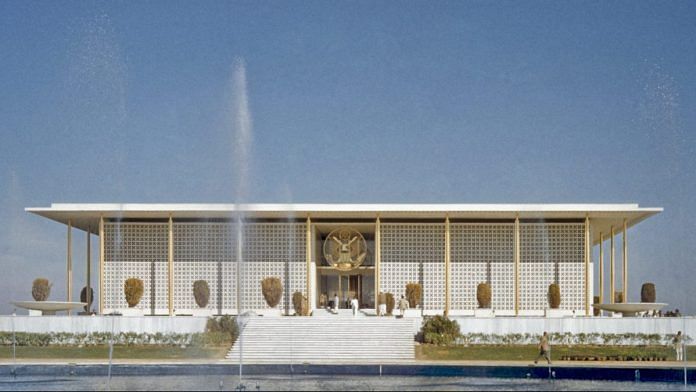Amid a period of heightened tensions between India and China, the United States is looking at ways to show support for India. For understandable reasons, defense cooperation comes to mind as the most obvious way to highlight the emerging US-India partnership. But widening regional cooperation is crucial to building more political support for the partnership. The United States should move more quickly in establishing a new consulate in India, an idea first announced in 2016. On the heels of the United States and China closing consulates in each other’s country, the symbolism alone would be particularly significant.
People-to-people connections between the United States and India remain a fundamental element of the US-India relationship. India has become the United States’ ninth-highest goods trade partner, an important services trade partner, and the second-largest source of foreign students, and Indian companies are rapidly expanding investments in the United States across a range of sectors. Indians comprised a whopping 74 percent of all H-1B visa applications in 2019.
But as outlined in the following chart, the US consular presence in India is spectacularly sparse, especially when considering population. India is a sizeable source of foreign visitors to the United States. Although India is not yet a significant destination for US tourists or college students, these numbers will likely continue to increase in the future.
The numbers below only count embassies and consulates. Other types of commercial and diplomatic missions are not included.

*Prior to recent closure of the U.S. consulate in Chengdu
** Includes the U.S. consulate in Bermuda
Having a consular presence means much more than simply processing visa applications or managing the security of US visitors in the region. Consulates play a critical role in hosting visits by policymakers, engaging rising political leaders, connecting with regional institutions, and much more. Many of India’s current political, cultural, and business leaders had been noticed by US consular staff early in their careers. The US Congress is considering legislation, the City and State Diplomacy Act, that will create a new office at the US Department of State charged with expanding subnational cooperation.
Expanding the US diplomatic presence in India is pivotal to building stronger bridges with India’s powerful regional political parties. Many desire local cooperation with the United States in the states they lead. Today, many of India’s largest states are run by regional parties that, in addition to running their home state, also have a sizeable presence in the Indian Parliament. Examples include the Telangana Rashtra Samithi Party in Telangana, the Trinamool Congress in West Bengal, the Biju Janata Dal in Odisha, the All India Anna Dravida Munnetra Kazhagam in Tamil Nadu, the Yuvajana Sramika Rythu Congress in Andhra Pradesh, and the Janata Dal United in Bihar, among others.
While the current ruling Bharatiya Janata Party (BJP) has won single-party majorities in the Lok Sabha, India’s lower house, in two consecutive elections, this is the exception—not the norm—in recent decades. Further, the BJP only holds 87 of 244 seats in the upper house of Parliament, Rajya Sabha. Building better relations with regional parties can widen and strengthen the overall base of political support in India.
There are numerous viable candidate cities to host a new consulate. These include Lucknow, Chandigarh, Bangalore, or Ahmedabad. The United States could even consider upgrading the existing North India Office in New Delhi, which is currently tasked with managing relations with India’s northern states. There is also a credible case for placing a new consulate in a smaller state in a strategic location such as Assam, Uttarakhand, or Himachal Pradesh.
The United States should consider multiple new consulates in India over the coming decades. In the meantime, following through on the earlier promise of a single new consulate, which would reiterate US support for India as tensions with China rise, is vitally important.
Richard M. Rossow is senior adviser and Wadhwani Chair in US-India Policy Studies, Center for Strategic & International Studies (CSIS), Washington DC. Views are personal.
This article was first published by the CSIS.




US war complex salivates about resurrecting East India Company v.2.0 in the 21st century under the camouflage of diplomacy. Surprisingly, there are a lot of takers in India, and US is using many NRI and their local agents to push this agenda. Let’s see if India has learnt any lesson from centuries of East India Company humiliation or willingly subjugate to white colonialism once more.